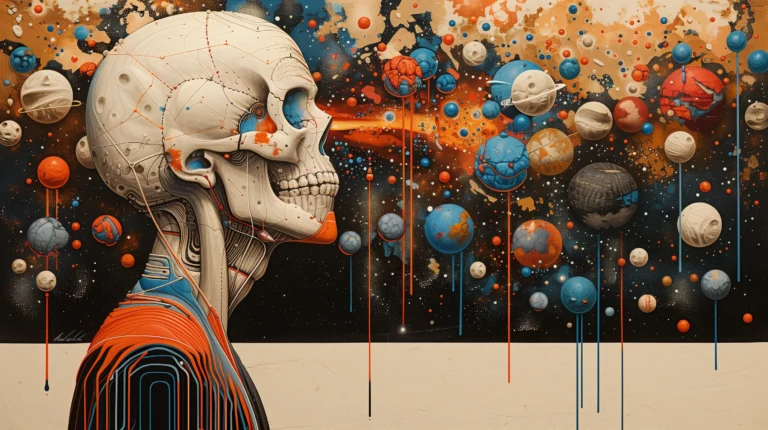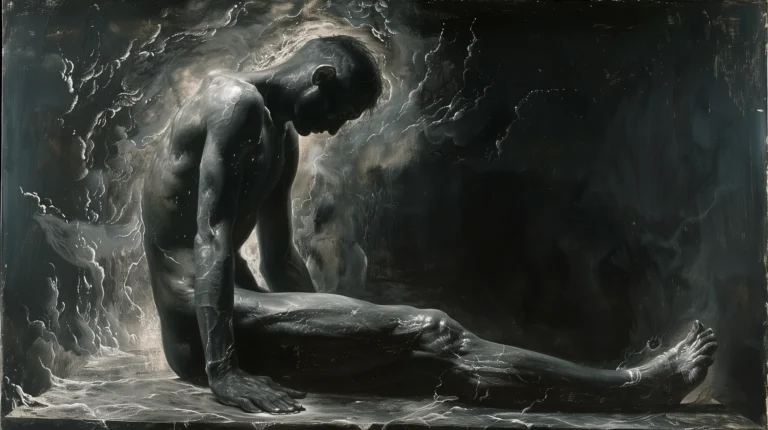The Divine Feminine and Ancient Aphorisms: The Spiritual Backflip in the Age of Aquarius
Introduction
Greetings and welcome to this enlightening guide, structured into two insightful parts.
In the first part, we will delve into the concept of the Divine Feminine, exploring its significance, representations, and the impact it has on spiritual and personal growth. By understanding and embracing the Divine Feminine, we can achieve a more balanced and harmonious existence.
In the second part, we will turn our focus to “The Book of the 24 Philosophers” (Liber XXIV Philosophorum). We will explore its historical background and examine its aphorisms, providing a deep dive into ancient wisdom that complements and enhances modern spiritual practices.
By the end of this guide, you will have a deeper understanding of both the Divine Feminine and the timeless insights from “The Book of the 24 Philosophers,” equipping you with the knowledge to foster spiritual growth and personal transformation.
Let’s get started.
Divine Feminine
Originating from the void, the essence of both the divine masculine and feminine emerges. “The void” symbolizes a state of nothingness which paradoxically contains the potential for everything in its most elevated forms.
This discussion centers on the divine feminine, the nurturing force that guides the masculine energy when the mind, ego, and body are overwhelmed.
The divine feminine is valued for guiding us through life’s greatest challenges. This energy appears in many cultural archetypes, including:
- Freyja, from ancient Norse mythology
- Oshun, worshipped by the Yoruba people in Nigeria
- Aphrodite, from ancient Greece
- Venus, from ancient Rome
- Hathor, from ancient Egypt
- Durga, from Hindu beliefs
- Asase Yaa (Aberewa), an earth spirit in the Akan religion
- Sophia, a symbol of wisdom and the feminine spirit in Gnostic Christianity
These figures have been extensively studied by ancient civilizations, so I won’t go into further detail here.
Discussing the divine feminine, it is crucial to recognize that without embracing, respecting, and allowing its uninhibited flow, our life force can become distorted and misdirected, leading to confusion and unchecked anger that affects not only the individual but those around them.
While masculine energy bolsters our willpower, its effectiveness is limited without the support of the divine feminine. Together, they transcend ordinary limits—there is no “sky” to confine their potential.
In every individual, both divine masculine and feminine energies coexist. Suppression of the feminine aspect can toxify masculine energy, and if masculine energy is suppressed, a lack of practicality ensues.
However, it’s important to note that without the balance provided by feminine energy, even practicality can devolve into the unfulfilling competitiveness of a capitalist system, which resembles a relentless rat race.
Carl Jung’s theories, further expanded by others, associate the feminine with mystical and spiritual dimensions such as the moon, soul, creativity, inwardness, darkness, chaos, intuition, and active receptivity.
In contrast, masculine energy typically aligns with the sun, spirit, light, immediate action, aspiration, and outwardness.
Adopting a feminine approach can be particularly healing for those experiencing depression, encouraging acceptance of inactivity and introspection over relentless striving and productivity.
The absence of divine feminine acceptance prevents individuals from achieving inner peace.
Historical narratives show how deities representing sky, war, and thunder have been conceptualized in masculine forms, leading to a dominant Yahweh consciousness in our era.
A deeper exploration with an open heart can reveal more about this dynamic.
The issue is that many people don’t truly understand what they want. When individuals are dissatisfied with themselves, they often project their inner irritation, anger, and hate onto others.
This negativity is especially common among those who are unconscious of their own feelings. They may hate the weather, their neighbors, or their colleagues, but in reality, they are struggling with self-hatred.
Or, if we speak in alchemical terms, they are not properly accepting the divine feminine in their journey towards the philosopher’s stone.
Instead of enlightenment, this misalignment results in destruction, as tragically exemplified by Hiroshima and Nagasaki.
Even in ideal conditions, they would find reasons for conflict due to their lack of self-awareness and lack of balancing the masculine and feminine energies.
Even if they were given heaven, they would find reasons to fight because they lack self-awareness.
This is why a capitalist system can be important for such individuals. It keeps them occupied, like rats in a race, until they achieve higher consciousness.
May they find peace in their hearts, as the greatest journey one can undertake is the journey from the mind to the heart, where the divine masculine meets the divine feminine and both rest in peace and become whole.
When you think of God, what image comes to mind? Ideally, our concept of the divine should transcend gender, but our material world and various influences shape our mental images.
Pause, breathe in and out, and observe from your higher self. Notice if your ego points to a masculine archetype of the divine.
If it does, try to shift towards a feminine energy instead. Ideally, it should be transcendental, but at least at the energy level, focus on a feminine archetype.
Remember, the divine mother sees you. Connect with Mother Earth. It’s the responsibility of masculine energy to care for her.
You might feel frustrated with environmental protestors who stop traffic and disrupt daily life, thinking about the inconvenience of being late for work and the stress it causes.
But remember, Yahweh isn’t going to hang you upside down for being late. Take a moment to breathe, relax, and reclaim your power, even if it’s just through your breath.
This era is not just about the Age of Aquarius; it’s also a time when the Divine Feminine is making a powerful comeback.
Like Mother Earth awakening a long-silent volcano, the Divine Feminine is embracing all parts of herself—both the dark and the light. She is reclaiming her truth, her power, and her innocence.
The Divine Feminine compels others to see themselves clearly. She is the guide that the Divine Masculine seeks when he needs direction.
She sparks widespread awakenings and brings healing to generations of family trauma.
Spirituality isn’t just about feeling good. It’s about recognizing yourself as a soul experiencing life physically.
However, defining spirituality is challenging because concepts like the spirit, the soul, and consciousness cannot be fully grasped by the mind, and that’s perfectly fine!
The old soul, hurt repeatedly, eventually becomes deeply wounded. The ultimate realization is that the ego can no longer guide one’s life journey.
While consciousness is eternal, the ego must dissolve to prevent the cycle from repeating. This journey transcends the body, mind, and ego.
Embrace the silence and emptiness; as the ego weakens, what seemed like emptiness turns into fullness.
As the ego-mind quiets, consciousness fills the heart.
Discovering the hellish realms is necessary to appreciate the value, beauty, goodness, and eternal love of consciousness that saves us all.
Let go of the ego’s agony, silence the mind, and let the heart speak.
Yogis, through their practices and teachings, have found that our true nature is beyond the physical body and mind.
According to yogic philosophy, who we are is pure consciousness, often referred to as the Atman or the Self.
This Self is eternal, unchanging, and inherently blissful, and it is connected to the universal consciousness, or Brahman.
Yogic practices, such as meditation, breath control, and ethical living, aim to help individuals realize this true nature by transcending the ego and the illusions of the material world.
The ultimate finding of yogis is that by turning inward and calming the mind, one can experience this profound truth and understand that the essence of our being is divine and interconnected with all of existence.
Alchemists and yogis ultimately discovered similar truths. Both traditions emphasize the journey of inner transformation and self-realization.
Alchemists found that the true “gold” was the enlightenment and purification of the self, while yogis realized that our true nature is pure consciousness and divine.
Both paths lead to a deeper understanding of oneself, inner peace, and connection with the universal or divine essence.
Yahweh, as understood in the context of Abrahamic religions, is seen differently than the principles of alchemy or yogic philosophy.
However, some mystical traditions within these religions, like Kabbalah in Judaism, Christian mysticism, and Sufism in Islam, do explore themes of inner transformation and a deeper, more personal experience of the divine, which can have parallels to the journeys of alchemists and yogis.
Yahweh consciousness, as represented in Abrahamic religions, differs markedly from the notions of balance found in alchemical or yogic philosophies, particularly concerning the integration of the divine feminine.
This singular masculine focus can lead to an imbalance, as it often marginalizes or entirely omits the divine feminine, which is essential for holistic spiritual harmony.
This absence of the divine feminine in the consciousness associated with Yahweh can contribute to societal and personal issues, including a collective sense of self-hatred and an inability to find internal peace.
In societies where this imbalance prevails, there is often a disconnection from traits traditionally associated with the feminine, such as empathy, intuition, and nurturing, leading to a culture dominated by aggression, competition, and disconnection from others.
This imbalance can explain the current state of unrest and dissatisfaction, highlighting the need for a spiritual reawakening that embraces both the divine masculine and feminine energies to restore wholeness.
Now is the pivotal moment to transcend the Yahweh consciousness that has long dominated our spiritual narratives.
As we learn to quiet the ego and let the heart guide us, we discover the profound depths of our own consciousness.
This journey invites us to move beyond traditional frameworks and ascend to a higher understanding where we embrace a more inclusive and balanced spirituality.
By expanding beyond the confines of established religious doctrines, we can foster a spiritual ascension that celebrates the unity and interconnectedness of all life, ultimately leading us towards a more harmonious and enlightened existence.
The only obstacle to achieving self-realization instantaneously in meditation is the lack of self-acceptance. It’s as simple as that.
This lack of self-acceptance means not fully embracing the divine feminine within ourselves.
If you accept yourself as you are, you will attain enlightenment and liberation. Let go of the need to know who you are.
Self-realization is about understanding that you can’t truly know who you are because you are unknowable, an ultimate mystery. Come on, baby. Grace of God.
This grace, which is not solely reliant on the divine masculine but also encompasses the divine feminine, invites us to move beyond traditional confines.
By acknowledging and integrating both aspects of the divine, we open ourselves to a more complete and profound spirituality that harmonizes all aspects of our being, leading us toward a more balanced and enlightened existence.
Liber XXIV Philosophorum
The Book of the 24 Philosophers
Now, in the second and final section of this guide, we will explore “The Book of the 24 Philosophers,” its historical background, and its aphorisms.
The Liber XXIV philosophorum, dating from around the 12th or 13th century, is a somewhat mysterious text.
Its author remains unknown, and there are debates regarding its exact origins.
Some scholars believe it has roots in the Hermetic tradition, while others suggest influences from Neoplatonism or even Gnosticism.
The text is a collection of twenty-four philosophical propositions, presented in the form of a dialogue among twenty-four philosophers.
Each proposition, given by a different philosopher, is an attempt to describe the nature of God, or the ultimate principle of reality. While these definitions differ in wording, they share a thematic unity, each seeking to express the ineffable.
The exact phrasing of the aphorisms in the “Liber XXIV philosophorum” can vary depending on the specific manuscript source and the translation.
However, I’ll provide a translation of these aphorisms as closely as possible. Here are the twenty-four definitions of God from the “Book of the Twenty-Four Philosophers.
Number 1:
“God is one, not after the manner of a number, but after the manner of an essence.”
(God is a singular entity but not in a numerical sense. Rather, God embodies the very essence of existence itself.)
Number 2:
“God is the monad generating the monad, returning to itself.”
(God is the origin and the end, creating from itself and returning back to itself.)
Number 3:
“God is the monad and the dyad, and on account of this he is called two.”
(God is both unity (the monad) and duality (the dyad), embodying both singular and dual aspects.)
Number 4:
“God is the source of the good, issuing forth from the good.”
(God is both the origin of all goodness and emanates from goodness itself.)
Number 5:
“God is one power, from whom are all powers.”
(God is the singular force from which all other forces or powers emerge.)
Number 6:
“God is a circle whose center is everywhere and circumference nowhere.”
(God is infinite and omnipresent, existing everywhere without any boundaries.)
Number 7:
“God is a sphere of spheres.”
(God encompasses all realities and dimensions, like a sphere that contains all other spheres.)
Number 8:
“God is a life living through life.”
(God is the life force that sustains all other life forms.)
Number 9:
“God is the totality of all things that are and are not.”
(God embodies everything that exists and does not exist, both the tangible and the intangible.)
Number 10:
“God is the totality of substances.”
(God is the sum of all matter and energy in existence.)
Number 11:
“God is the life of all living beings.”
(God is the source and sustainer of life in all its forms.)
Number 12:
“God is the totality of forms and the form of all forms.”
(God embodies all possible forms and is the blueprint of all forms.)
Number 13:
“God is the mind of the substance of all.”
(God is the ultimate consciousness or intelligence underlying all of existence.)
Number 14:
“God is the life of the dead, the death of the living, the light of the blind, and the darkness of those who see.”
(God transcends opposites, bringing life to the dead and death to the living, illumination to the blind and darkness to those who see.)
Number 15:
“God is a sea flowing through itself.”
(God is a self-contained and self-sustaining entity, like a sea that flows into itself.)
Number 16:
“God is the unity of the first and the last.”
(God unifies the beginning and the end, the alpha and the omega.)
Number 17:
“God is the unity of a spirit and a body.”
(God encompasses both the physical (body) and the spiritual (spirit).)
Number 18:
“God is the fire by which all things shine without being consumed.”
(God is the illuminating force that brings light to all things but doesn’t diminish or consume them in the process.)
Number 19:
“God is a discourse containing all things in a word.”
(God embodies all existence within a single divine Word or Logos.)
Number 20:
“God is the night in the soul, which is the son of God.”
(God is the mystery and unknowable depth within the human soul, which is considered a child of God.)
Number 21:
“God is a word creating things, a word moving things, a word perfecting things.”
(God is the divine Word that brings things into existence, propels them into motion, and leads them to perfection.)
Number 22:
“God is the eternity of a day.”
(God embodies the concept of eternity within the temporal framework of a day.)
Number 23:
“God is a mirror, not colored, not figured, not adorned.”
(God is like a pure mirror that reflects all things without any distortion or decoration.)
Number 24:
“God is a good which is not good except through itself.”
(God is the ultimate good, whose goodness is self-derived and not dependent on anything else.)
To conclude, the Liber XXIV Philosophorum is more than just a historical artifact; it is a testament to humanity’s ongoing quest for understanding.
It blends philosophy, theology, and mysticism, inviting us to engage in a centuries-old dialogue.
Whether you study it academically or with a seeker’s heart, this text has something profound to offer.
Conclusion
In this guide, we have explored the profound concepts of the Divine Feminine and the wisdom of ancient philosophies, leading us towards a deeper understanding of spiritual harmony.
Carl Jung described the anima as the inner feminine side of men, symbolized by figures like Aphrodite, Selene, and Persephone.
He saw the anima as the “archetype of life itself,” essential for personal and spiritual growth.
When the divine masculine and feminine energies balance and cancel each other out, what remains is nothingness, which paradoxically holds the essence of everything—God’s energy.
From this void, the true self is born.
Instead of looking outward for answers, turn inward. Embrace Mother Earth, the Divine Feminine within.
This inner journey, this spiritual backflip, transforms your energy field.
The archetype of Shiva teaches us to destroy the ego, allowing the rebirth of a transcended self under the feet of Mother Kaali.
Close your eyes and venture deep within. Beyond mind, body, and ego lies your true prayer. The Divine Feminine will guide you, making you feel at home.
Kneel in reverence; the Divine Feminine will lead you. The journey is mysterious and unpredictable, but love can be your compass.
Follow where your heart and The Divine Feminine guide you through the dark night of the soul, into the unknown where you cannot see light.
No one knows the exact path of spiritual awakening, but leaning towards love will never lead you astray.
Understanding this message is the key to peace, while misusing it can open the doors to hell.
Sometimes, experiencing hell is necessary for true healing and appreciating the difference between suffering and peace.
Embrace this journey with an open heart, and let the Divine Feminine guide you towards spiritual harmony and a deeper connection with all of existence.
The Divine Feminine gives rise to the Divine Masculine. The Soul gives rise to the Spirit, and that is the law, my friend.
The reality is that things might never be perfect, but you have to accept yourself as you are. It is what it is.
Accept yourself, love yourself, and trust in yourself. Things might not change, but you will find the courage and grace to go through everything as it is.
Stay focused, balanced, and at peace, knowing that everything is unfolding in Divine order and at the right time.
We give rise to gods, not the other way around. Use the archetypes of gods, angels, and demons for self-improvement and the collective good, not to lower your vibration.
Don’t worry; the universe is for you, not against you. Be present, breathe, observe, feel, transmute, and heal.
Everything happens for a reason.
Ordinary states of consciousness have their limits. Explore non-ordinary states where the real transformation begins.
Be just with each other. Those who are stronger should not abuse the weaker. Distribute resources fairly.
We are all under universal laws. You have the ability to make the most of what the universe has given you. You have enormous resources within you to make your life a work of divine art.
Love for all, love for the Divine Feminine.
Supreme Dreamer
In dreams within dreams, a world we find,
Where the supreme Dreamer holds all in mind.
Be humble and open, let Shakti flow,
To uplift our spirits, and help us grow.
This dream world we wander, so vast and wise,
Understand its symbols, see through disguise.
If lessons we learn before karma’s call,
We can sidestep the suffering, avoiding the fall.
Raise your vibration, let frequency rise,
Become part of the dreaming intelligence, so wise.
Stay present in life, with each breath and start,
Respond with the wisdom of the Dreamer’s art.
For the longest journey, though it may seem long,
Is the path from the mind to the heart, where we belong.
Do not fear the cycles that repeat and twine,
For in dreams within dreams, new wisdom we find.
Cycles within cycles, each turn a new chance,
To grow and to learn in this cosmic dance.
Embrace the patterns, let consciousness guide,
In the endless dreamscape, let love be our stride.
Life’s a mystery, flip flip flip,
Backflip into the unknown’s grip.
Close your eyes, the journey’s here,
Go deep inside, beyond all fear.
Mind and body, ego shed,
In this prayer, by Earth you’re led.
Divine Feminine, guiding light,
Feels like home, day or night.
Kneel down low, in her care,
Divine feminine takes you there.
Who knows where this path will go?
No one knows, just let it flow.
Today’s gifts, what will they bring?
No one knows, just let love sing.
Follow your heart, trust its view,
Where divine feminine leads you.
Awakening’s road, unknown and vast,
Love as your compass, a guiding mast.
Lean towards love, it’s always true,
It won’t let you down, it sees you through.







